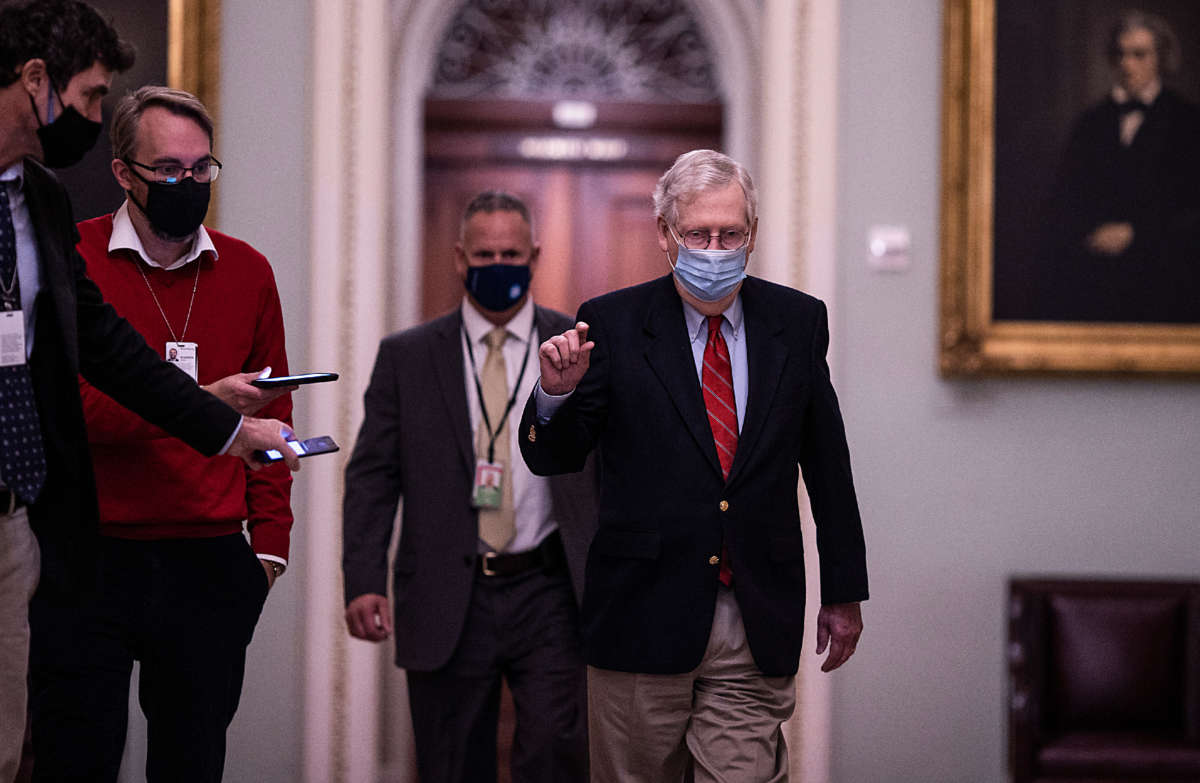Congressional leaders announced on Sunday that a deal between Democrats and Republicans had been reached to provide significant aid to Americans struggling with the financial impact of the coronavirus pandemic.
But while the nearly $900 billion deal includes a direct stimulus payment to most Americans, many critics have lambasted the amount that was agreed upon, $600, as too little to help those who are struggling to pay rent, bills or other debts during the crisis.
Senate Majority Leader Mitch McConnell (R-Kentucky) announced on Twitter that a deal had been reached shortly after it was brokered.
“As the American people continue battling the coronavirus this holiday season, they will not be on their own,” McConnell wrote. “Congress has just reached an agreement. We will pass another rescue package ASAP. More help is on the way.”
Speaker of the House Nancy Pelosi also lauded the deal. “We are going to crush the virus and put money in the pockets of the American people,” she said in a statement.
The bill will include a number of provisions meant to help Americans and small businesses during these trying times.
Unemployment insurance will be extended for 11 weeks, with an additional $300 added to the typical unemployment check (or about half of the additional funds that were part of a similar COVID relief package earlier this year). The bill also includes $284 billion for payroll loans to businesses to help them continue paying workers, including $15 billion to live venues, movie theaters, and other entertainment. Around $10 billion will be dedicated to child care assistance as well.
But most of the provisions will not go directly to workers. The bill provides $15 billion to the airline industry, for example, with $2 billion going to airports. The bill also includes a tax deduction for corporate meal expenses that critics have dubbed the “three martini lunch” tax cut, allowing corporate executives to write-off on their taxes lunch expenses.
The White House has suggested that this tax cut will help restaurants, but critics have said that it would do very little to actually provide aid to the struggling industry, and would more likely pad the pockets of those who are not in need of help during the pandemic.
Perhaps the most discussed aspect of the agreement is the direct payment of $600, which is planned to go to most American adults in the country earning under $75,000 per year for individuals ($150,000 for couples). Those who earn above that amount will receive stimulus payments that gradually lessen as they earn more, with individuals earning above $99,000 this past year (or $198,000 for couples) receiving zero dollars in assistance. Families will also receive $600 for each dependent child in their home.
While any amount of stimulus payment will provide some relief, critics contend the payments are far too small to help most Americans, noting that they won’t even cover rent for most in the country.
Although the bill includes $25 billion in rental assistance, an analysis from Moody’s Analytics this month found that Americans have collected close to $70 billion in rental debt as they enter the New Year. That means, for many in dire need of such help, that those $600 payments will likely go toward paying rent or mortgage payments.
Unfortunately, $600 is far less than what most pay when it comes to renting a place to live. Indeed, according to research from Experian, no state in the nation has a median rental rate that is under $800. Forty-one states plus Washington, D.C. have median rental rates of $1,000 and above.
“$600 won’t cover the rent or the bills that have piled up” since the start of debate for a new stimulus began, Georgia Democratic candidate for Senate Jon Ossoff tweeted upon news of the deal. “We deserve better.”
Many Americans may share those sentiments, according to an unofficial Twitter poll that Rep. Alexandria Ocasio-Cortez (D-New York) tweeted last week.
Is $600 for a second COVID check enough?
— Alexandria Ocasio-Cortez (@AOC) December 16, 2020
Only 5.3 percent who responded to the informal poll said that a $600 stimulus payment would be “enough.” Around 32 percent answered the poll by clicking “no,” while the remaining 62 percent in the survey responded with “hell no.”
Join us in defending the truth before it’s too late
The future of independent journalism is uncertain, and the consequences of losing it are too grave to ignore. To ensure Truthout remains safe, strong, and free, we need to raise $24,000 by the end of today. Every dollar raised goes directly toward the costs of producing news you can trust.
Please give what you can — because by supporting us with a tax-deductible donation, you’re not just preserving a source of news, you’re helping to safeguard what’s left of our democracy.
